The AMD Ryzen 9 7950X3D Review: AMD's Fastest Gaming Processor
by Gavin Bonshor on February 27, 2023 9:00 AM ESTCPU Benchmark Performance: Rendering And Encoding
Rendering tests, compared to others, are often a little more simple to digest and automate. All the tests put out some sort of score or time, usually in an obtainable way that makes it fairly easy to extract. These tests are some of the most strenuous in our list, due to the highly threaded nature of rendering and ray-tracing, and can draw a lot of power.
If a system is not properly configured to deal with the thermal requirements of the processor, the rendering benchmarks are where it would show most easily as the frequency drops over a sustained period of time. Most benchmarks in this case are re-run several times, and the key to this is having an appropriate idle/wait time between benchmarks to allow for temperatures to normalize from the last test.
One of the interesting elements of modern processors is encoding performance. This covers two main areas: encryption/decryption for secure data transfer, and video transcoding from one video format to another.
In the encrypt/decrypt scenario, how data is transferred and by what mechanism is pertinent to on-the-fly encryption of sensitive data - a process by which more modern devices are leaning to for software security.
We are using DDR5 memory on the Ryzen 9 7950X3D and the other Ryzen 7000 series we've tested. This also includes Intel's 13th and 12th Gen processors. We tested the aforementioned platforms with the following settings:
- DDR5-5600B CL46 - Intel 13th Gen
- DDR5-5200 CL44 - Ryzen 7000
- DDR5-4800 (B) CL40 - Intel 12th Gen
All other CPUs such as Ryzen 5000 and 3000 were tested at the relevant JEDEC settings as per the processor's individual memory support with DDR4.
Rendering
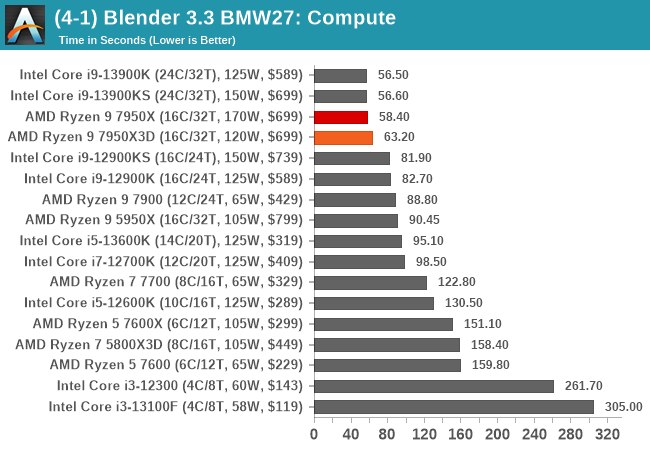
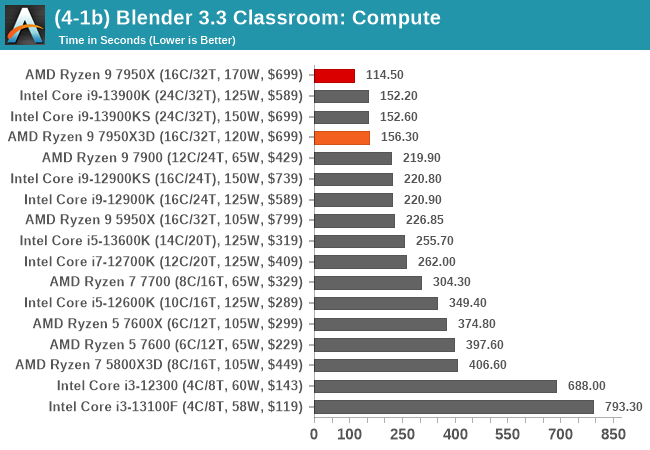
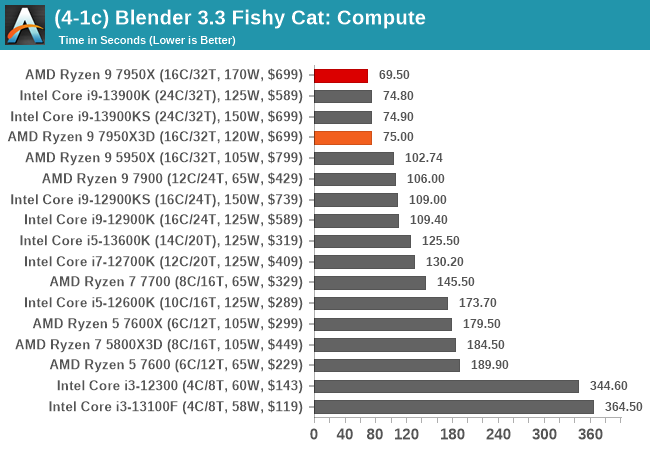
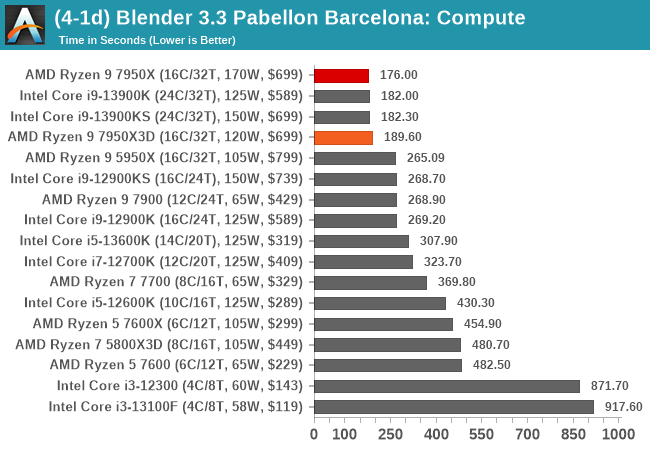
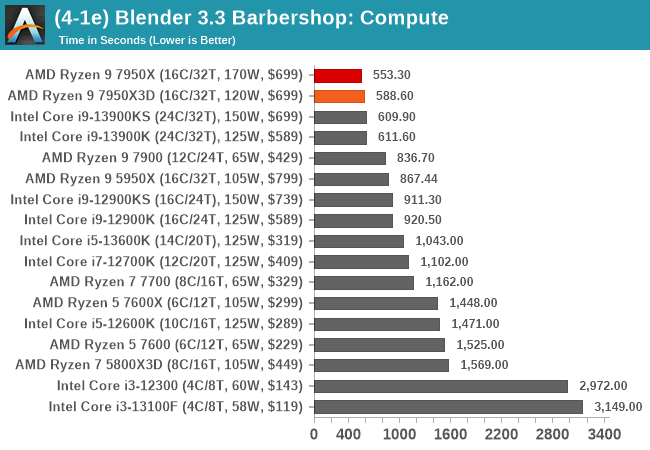
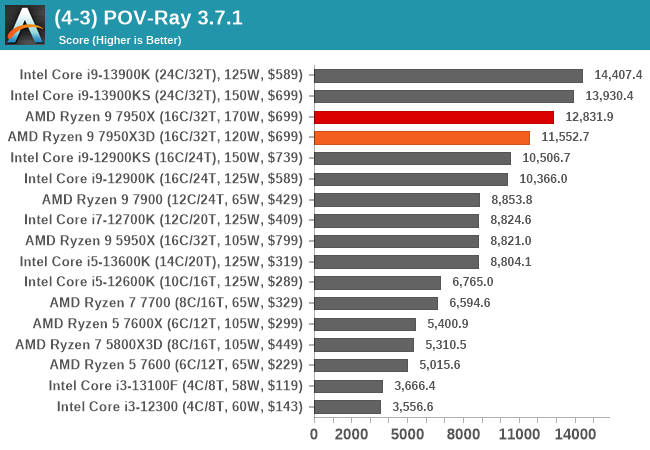
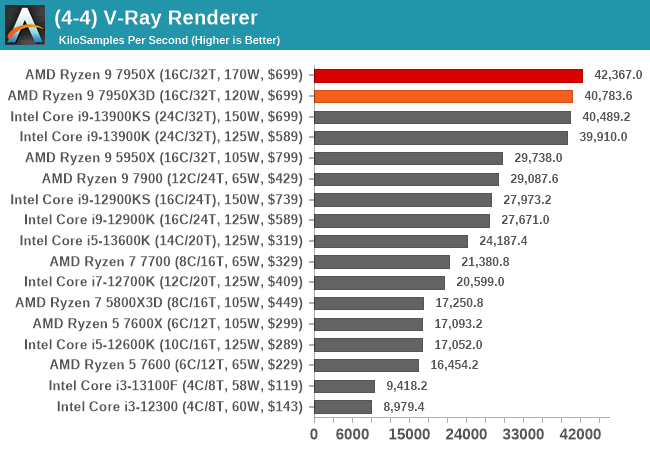
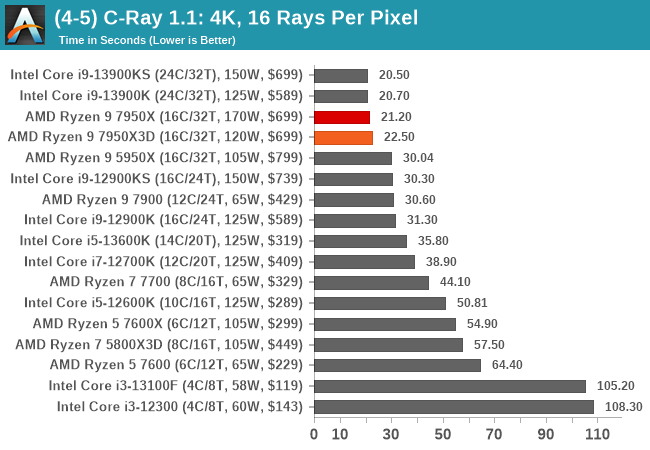
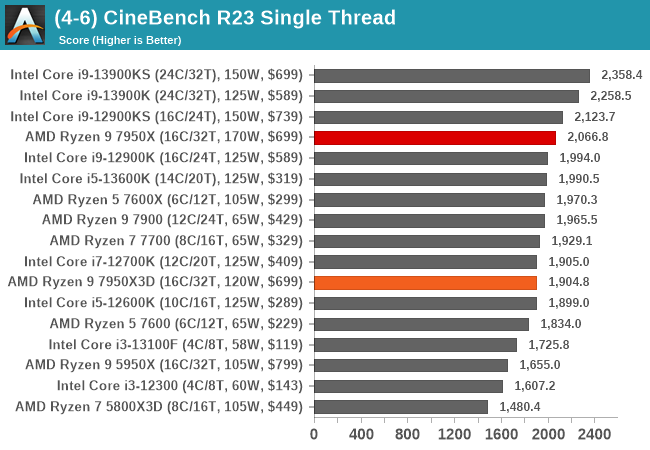
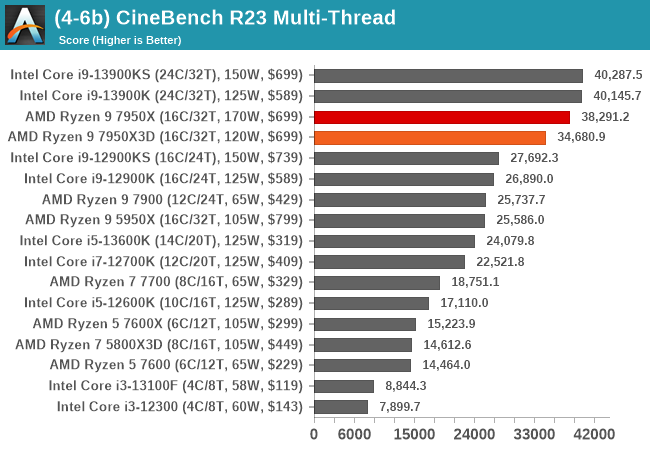
When it comes to rendering, the Ryzen 9 7950X3D doesn't quite hit the compute performance of the Ryzen 9 7950X, but it isn't too far off, given the discrepancies in power usage. It shows that the 7950X3D is more than capable of rendering workloads in an effective manner.
Encoding
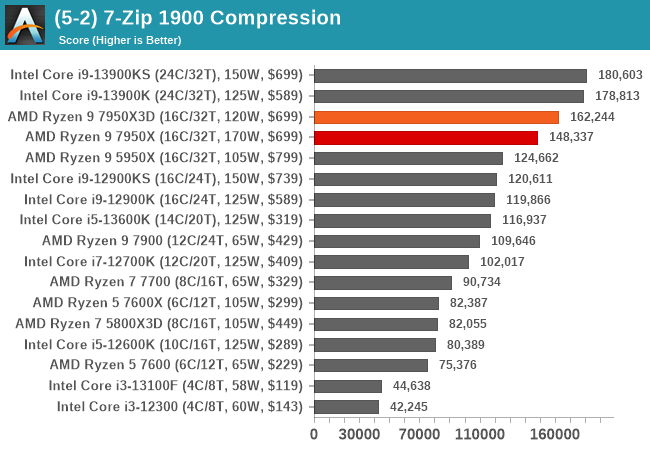
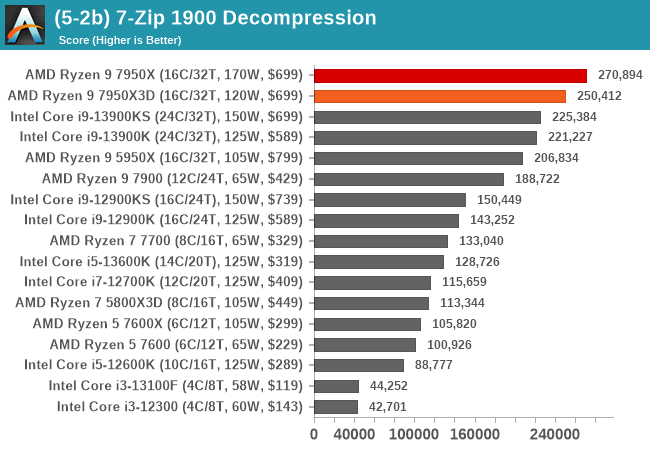
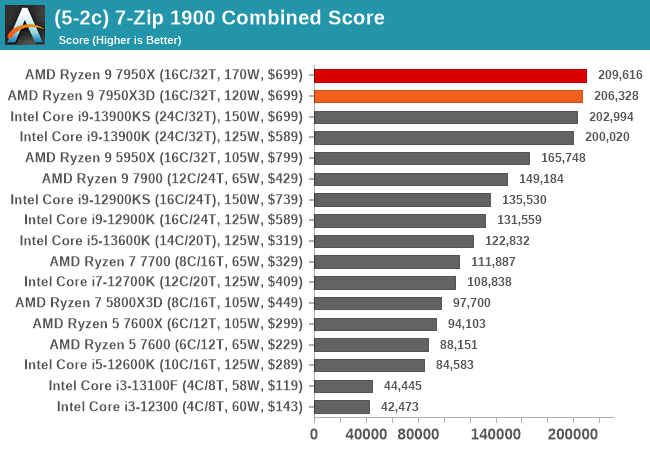
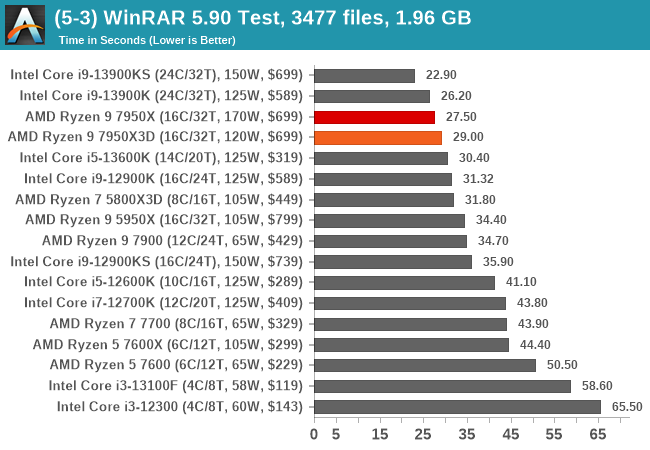
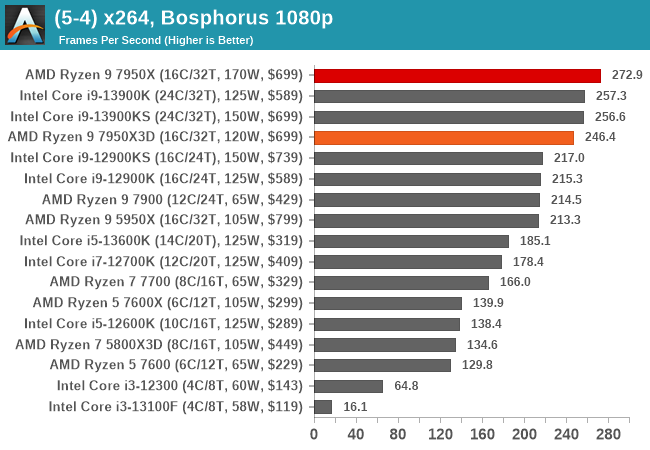
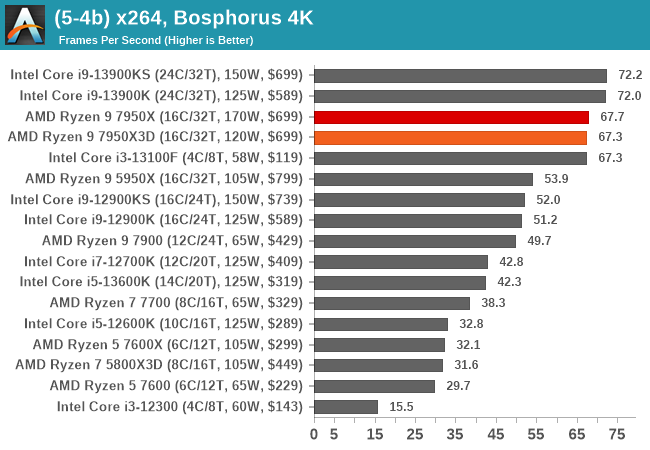
Our encoding section of the test suite is similar to other sections, where the 7950X is the faster and more power-hungry chip, which does output more performance. The Ryzen 9 7950X3D does however put in a respectable performance.










122 Comments
View All Comments
Gavin Bonshor - Monday, February 27, 2023 - link
I'm currently in the middle of testing data in all three modes (Auto, Cache, and Frequency mode)Dante Verizon - Monday, February 27, 2023 - link
Radeon RX 6950 XT - There will be no significant differences using this GPUMakaveli - Monday, February 27, 2023 - link
The GPU is fine the bigger issue for me is those terrible memory speeds being used. Nobody buys jedec memory for their builds unless you are an OEM.Ryan Smith - Monday, February 27, 2023 - link
This discussion comes up now and then. But right now our stance remains unchanged: when AMD is willing to warranty memory overclocking, we'll start using it as a base setting.Otherwise, it's disingenuous to test a CPU in a state that's outside its normal operating parameters, and which would result in an RMA being rejected if anything happened to it.
Otritus - Monday, February 27, 2023 - link
I think you should put this note inside the review and future reviews because it is a valid reason for why it is being benchmarked as such.lopri - Wednesday, March 1, 2023 - link
Agreed 100%Oxford Guy - Wednesday, March 1, 2023 - link
Has AMD or Intel ever denied a warranty claim because someone used an XMP profile?I'd love to see an article about that!
blkspade - Wednesday, March 22, 2023 - link
Intel RMA survey actually asks if you used XMP as grounds to deny your RMA. They count it as oveclocking. AMD on the other hand doesn't even ask about memory profiles. I've had to do a RMA for both an i7 7700 and a R7 2700.nandnandnand - Monday, February 27, 2023 - link
Looks like a messy faceplant with the scheduler issues.RHamel - Monday, February 27, 2023 - link
Yes, the scheduler clearly isn't smart enough to assign threads to the optimal CCD with any consistency. AMD's "best of both worlds" design ends up being the worst of both worlds about half the time.They should have just put the 3D V-Cache on both CCDs and avoided this whole mess; anyone putting this (instead of a 7950X) in a workstation/HEDT obviously is running some kind of cache-limited workload and would prefer extra L3 on all cores to this design even if the scheduler worked perfectly.